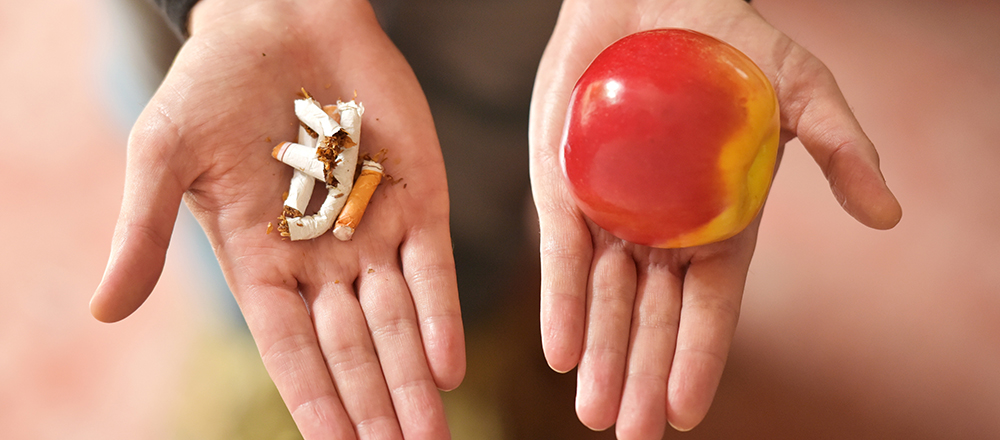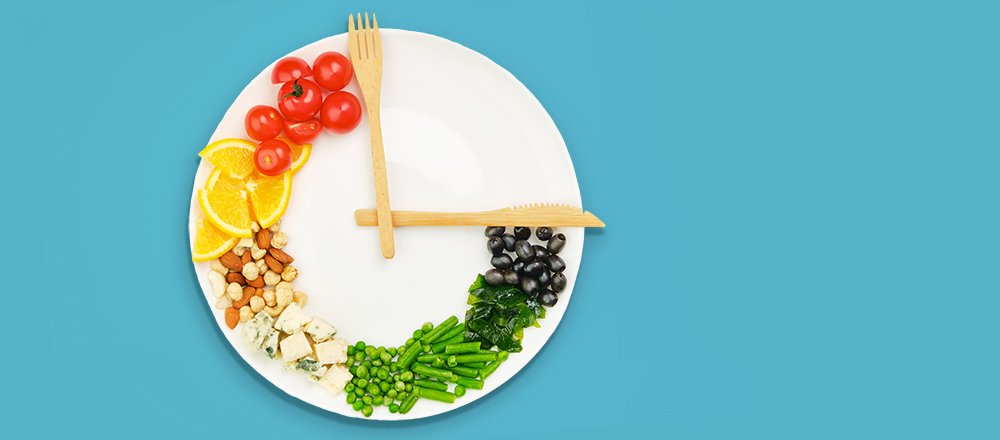Quitting Smoking Without Weight Gain: You Can Do Both
October 27, 2022By: Becky Hager
Categories: Nutrition, Weight Loss Management, Your Wellness

Bravo. You’ve decided to become a non-smoker, but you may have one nagging thought: What if giving up the smokes leads to weight gain?
Why Can Quitting Pack on the Pounds?
Some people gain weight because nicotine increases your metabolism slightly, so you burn more calories. When you quit, your metabolism returns to normal, which means your body burns fewer calories than when you smoked.
Add to your adjusted metabolism the natural tendency to turn to food to fight nicotine cravings, and you can see how your weight can creep up. Eating also gives you something to do with your hands and replaces the habit of putting a cigarette in your mouth.
But there’s good news. Weight gain is usually less than 10 pounds and it doesn’t hang around long. You can win the battle and gain a healthier, non-smoking life. Use these tips to avoid packing on the pounds or to drop them if you do.
Make Food Work for You
Smoking reduces your appetite. Feeling hungrier may seem like a downside of quitting but keep your focus on your overall health. Quitting actually gives you a double dose of health benefits. It reduces your risk for smoking-related illnesses and diseases and provides the opportunity to improve your diet with healthy foods to fight cravings and weight gain.
Our North Kansas City Hospital dietitians offer these tips for fending off the pounds:
- Focus on eating lean proteins and high-fiber veggies and fruit, which help you feel full longer and more satisfied.
- Get your ZZZs. Lack of sleep impacts your appetite hormones, making you feel hungrier.
- Keep your mouth busy. Chewing sugarless gum, drinking water or sucking on a mint-flavored toothpick are all helpful (and low-calorie) strategies.
- Limit caffeine. Too much caffeine can make you irritable and more likely to reach for a cigarette.
- Plan your meals and snacks to help keep you on track. Aim to have three portion-controlled meals and set snacks. Calories from random grazing and BLTs (bites, licks and tastes) add up quickly.
- Keep trigger foods out of the house. The principle of “out of sight, out of mind,” applies here. Make sure your favorite trigger foods are out of reach to help you avoid temptation.
Know Your Triggers and Make a Plan
Smoking is a habit that’s triggered by specific situations. Research shows the most effective way to change a behavior is to eliminate or change the trigger associated with it. Rather than reaching for a cigarette or food to quell the craving, consider these solutions to your triggers:
- After a meal: Don’t linger at the table. Go for a short walk, brush your teeth or start cleaning up.
- On the drive home from work: Crank up the tunes and belt them out while driving home or try snacking on low-calorie snacks.
- While having a drink and socializing with friends: Consider socializing at places where smoking isn’t allowed.
- While watching television: Work on a jigsaw puzzle, crafts, knitting or embroidery to keep your hands busy.
- With your morning coffee: Wake up and journal for five minutes with your morning coffee.
Get Moving
Physical activity boosts your metabolism. Exercise burns calories, takes the edge off your appetite and reduces the craving for a cigarette and the urge to eat.
If exercise is new to you, start slow. As little as 10 minutes of daily exercise (walking is a great choice) will make a difference. Work your way up to at least 30 minutes. You’ll get a boost in serotonin (the feel-good hormone), energy and fitness level.
Remember Your “Why”
The mental game of quitting is a big part of becoming a healthier non-smoker. When you feel the urge to reach for a cookie to fight a craving for a cigarette, take a moment to think about those reasons that motivated you to finally ditch your smoking habit. Ask yourself, “What would the healthy version of me do?” Focus on how your new healthy habits are paving the way to a healthier, happier life for the long term.
Be Your Own Cheerleader
Even if you gain a few pounds after stubbing out smoking, you have so much to celebrate. Quitting is a huge accomplishment, and the lifestyle changes you’ve made will significantly impact your health.
Studies show that for many people becoming a non-smoker is just the start to a healthier life.
You Don’t Have to Go It Alone
Giving up tobacco is tough. That’s why we're here to help. Register for our free program that will help you quit for good. It’s online, making it convenient to attend and you can join anytime.



